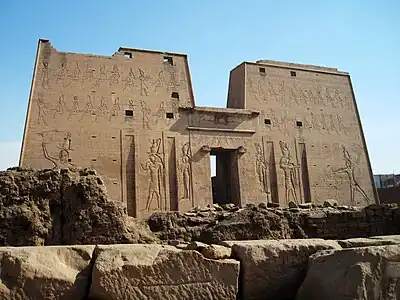ḥwt-nṯr
Egyptian

Etymology
From ḥwt (“enclosure”) + nṯr (“god”) in a direct genitive construction, thus literally ‘house of god’. The written form demonstrates honorific transposition.
Pronunciation
- (reconstructed) IPA(key): /ħawitˈnaːcaɾ/ → /ħajiʔˈnaːtaʔ/ → /ħəjəˈnaːta/ → /ħəjəˈnoːtə/
- (modern Egyptological) IPA(key): /huːt nɛt͡ʃɛr/
- Conventional anglicization: hut-netjer
Inflection
Declension of ḥwt-nṯr (feminine)
| singular | ḥwt-nṯr |
|---|---|
| dual | ḥwtj-nṯr |
| plural | ḥwwt-nṯr |
Derived terms
Descendants
The following descendant has been proposed, but Vycichl disputes it on phonetic grounds (compare the regular development of Sahidic Coptic ⲛⲟⲩⲧⲉ (noute) from nṯr):
- >? Sahidic Coptic: ϩⲉⲛⲉⲉⲧⲉ (heneete)
References
- Faulkner, Raymond Oliver (1962) A Concise Dictionary of Middle Egyptian, Oxford: Griffith Institute, →ISBN
This article is issued from Wiktionary. The text is licensed under Creative Commons - Attribution - Sharealike. Additional terms may apply for the media files.